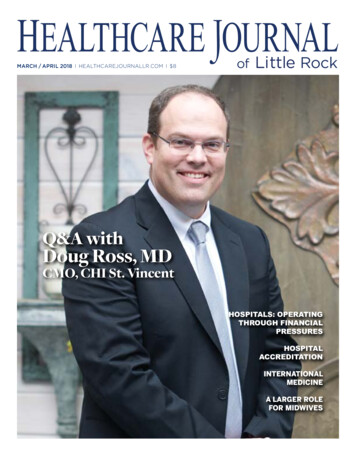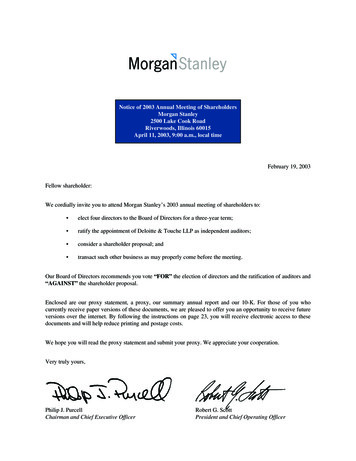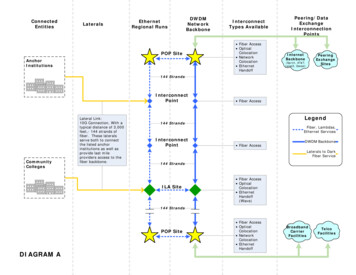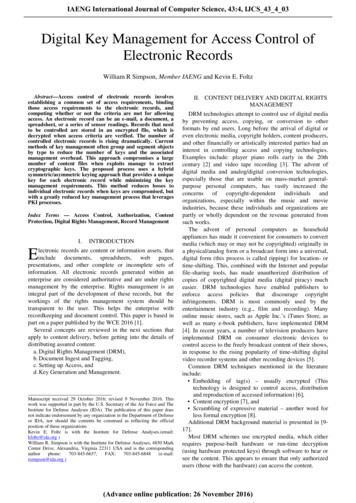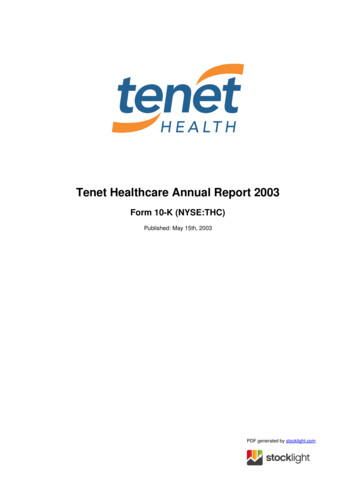
Transcription
Tenet Healthcare Annual Report 2003Form 10-K (NYSE:THC)Published: May 15th, 2003PDF generated by stocklight.com
QuickLinksForm 10-KoAnnual report pursuant to section 13 or 15(d) of the Securities Exchange Act of 1934 for the fiscal yearended.ORýTransition report pursuant to section 13 or 15(d) of the Securities Exchange Act of 1934 for thetransition period from June 1, 2002 to December 31, 2002.TENET HEALTHCARE CORPORATION(Exact name of registrant as specified in its charter)Nevada(State or other jurisdiction ofincorporation or organization)95-2557091(IRS EmployerIdentification No.)3820 State StreetSanta Barbara, CA 93105(Address of principal executive offices)(805) 563-7000(Registrant's telephone number, including area code)Securities registered pursuant to Section 12(b) of the Act:Common stock85/ 8% Senior Notes due 200377/ 8% Senior Notes due 20038% Senior Notes due 200553/ 8% Senior Notes due 20065% Senior Notes due 200763/ 8% Senior Notes due 201161/ 2% Senior Notes due 201273/ 8% Senior Notes due 201367/ 8% Senior Notes due 203181/ 8% Senior Subordinated Notes due 2008New York Stock Exchange and Pacific Stock ExchangeNew York Stock ExchangeNew York Stock ExchangeNew York Stock ExchangeNew York Stock ExchangeNew York Stock ExchangeNew York Stock ExchangeNew York Stock ExchangeNew York Stock ExchangeNew York Stock ExchangeNew York Stock ExchangeIndicate by check mark whether the Registrant (1) has filed all reports required to be filed by Section 13 or 15(d) of the Securities Exchange Act of1934 during the preceding 12 months and (2) has been subject to such filing requirements for the past 90 days: Yes ý No oIndicate by check mark if disclosure of delinquent filers pursuant to Item 405 of Regulation S-K (§229.405 of this chapter) is not contained herein,and will not be contained, to the best of the Registrant's knowledge, in definitive proxy or information statements incorporated by reference in Part III ofthis Form 10-K or any amendment to this Form 10-K. ýIndicate by check mark whether the Registrant is an accelerated filer (as defined in Exchange Act Rule 12b-2): Yes ý No oCONTENTSPART IItem 1.Business2Item 2.Properties7Item 3.Legal Proceedings19Item 4.Submission of Matters to a Vote of Security Holders27Item 5.Market for Company's Common Equity and Related Stockholder Matters28Item 6.Selected Financial Data29Item 7.Management's Discussion and Analysis of Financial Condition and Results of Operations31PART II
Item 7A.Quantitative and Qualitative Disclosures about Market Risk55Item 8.Financial Statements and Supplementary Data56Item 9.Consolidated Financial Statements58Notes to Consolidated Financial Statements62Changes in and Disagreements with Accountants on Accounting and Financial Disclosure90Item 10.Directors and Executive Officers of the Registrant91Item 11.Executive Compensation96Item 12.Security Ownership of Certain Beneficial Owners and Management111Item 13.Certain Relationships and Related Transactions114Item 14.Controls and Procedures116Item 15.Principal Accountant Fees and Services116Exhibits, Financial Statement Schedules and Reports on Form 8-K117PART IIIPART IVItem 16.PART IITEM 1. BUSINESSGENERALTenet Healthcare Corporation (together with its subsidiaries referred to as "Tenet," the "Company," "we," or "us") is the second largest investorowned health care services company in the United States. At December 31, 2002, our subsidiaries and affiliates (collectively "subsidiaries") owned oroperated 114 domestic general hospitals with 27,870 licensed beds and related health care facilities serving urban and rural communities in 16 states.They also owned one general hospital and related health care facilities in Barcelona, Spain, and held investments in other health care companies. Ourrelated health care facilities included a small number of rehabilitation hospitals, specialty hospitals, long-term-care facilities, a psychiatric facility andmedical office buildings—all of which are located on the same campus as, or nearby, one of our general hospitals. Our subsidiaries also owned physicianpractices and various ancillary health care businesses, including outpatient surgery centers, home health care agencies, occupational and rural healthcare clinics and health maintenance organizations.In March 2003, our board of directors approved a change in our fiscal year. Instead of a fiscal year ending on May 31, we will now have a fiscal yearthat coincides with the calendar year, effective December 31, 2002. Our next quarterly report will cover the three months ended March 31, 2003 and willbe the first quarterly report for the fiscal year ending December 31, 2003. We plan to file that report by May 15, 2003.Tenet's operating strategies include initiatives to (1) focus on core services such as cardiology, orthopedics and neurology designed to meet thehealth care needs of the aging baby-boomer generation, (2) improve the quality of care provided at its hospitals by identifying best practices andexporting those best practices to all of its hospitals, (3) improve operating efficiencies and reduce costs while maintaining or improving the quality of careprovided, (4) reduce bad debts and improve cash flow, (5) acquire new, or expand and enhance existing, integrated health care delivery systems,(6) improve patient, physician and employee satisfaction, and (7) improve recruitment and retention of nurses and other employees.We regularly review our subsidiaries' portfolio of facilities to assess performance and allocate resources. We intend to continue our strategicacquisitions of, and partnerships or affiliations with, additional general hospitals and related health care businesses in order to expand and enhance ourintegrated health care delivery systems. At times, we also may close or sell facilities or convert them to alternate uses.As discussed in more detail under Operations on page 3, our subsidiaries acquired one general hospital, closed one, and sold another during theseven-month transition period ended December 31, 2002 ("reporting period"). During this period, we also began construction on a general hospital inFrisco, Texas. On March 18, 2003, we announced our intention to divest 14 general hospitals.On March 1, 2001, we entered into a senior unsecured 500 million 364-day credit agreement and a senior unsecured 1.5 billion 5-year revolvingcredit agreement. On February 28, 2002, we renewed the 364-day agreement. Those credit agreements allowed us to borrow, repay and reborrow up to 2 billion prior to March 1, 2003 and up to 1.5 billion prior to March 1, 2006. We had 1.0 billion available under our credit agreements at December 31,2002. Subsequently, Tenet's January 2003 issuance of 1 billion of 73/ 8% Senior Notes due 2013 enabled us to repay our then current borrowings underthose credit facilities. The 500 million 364-day credit agreement expired on February 28, 2003; it was undrawn and not renewed.The Company and its subsidiaries operate in one line of business: the provision of health care through general hospitals and related health carefacilities. Our domestic general hospitals generated93.4%, 95.8% and 96.9% of our net operating revenues in the years ended May 31, 2000, 2001 and 2002, respectively, and 97.1% in the seven-monthperiod ended December 31, 2002.
Through March 10, 2003, we had organized these general hospitals and our other health care related facilities into three operating segments ordivisions. The divisions' economic characteristics, the nature of their operations, the regulatory environment in which they operated and the manner inwhich they were managed were all similar. The components of these divisions shared certain resources and they benefited from many common clinicaland management practices. Accordingly, we aggregated these divisions into a single reportable operating segment, as that term is defined by Statementof Financial Accounting Standards No. 131, "Disclosures about Segments of an Enterprise and Related Information."On March 10, 2003, we announced the consolidation of our operating divisions from three to two with five new underlying regions. Our new EasternDivision will consist of three regions—Florida, Central-Northeast and Southern States. These regions will initially include 59 of our general hospitalslocated in Alabama, Arkansas, Florida, Georgia, Louisiana, Massachusetts, Mississippi, Missouri, North Carolina, Pennsylvania, South Carolina andTennessee. Our new Western Division will consist of two regions—California and Texas—and will initially include 55 of our hospitals located in California,Nebraska, Nevada and Texas.OPERATIONSAll of Tenet's operations are conducted through its subsidiaries. At December 31, 2002, our subsidiaries operated 114 domestic general hospitalswith 27,870 licensed beds serving urban and rural communities in 16 states. Of those general hospitals, 94 are owned by Tenet subsidiaries and 20 areowned by third parties and leased by Tenet subsidiaries (including one Tenet-owned facility that is on land leased from a third party). A Tenet subsidiaryalso owns one general hospital and ancillary health care operations in Barcelona, Spain.During the reporting period, a subsidiary acquired Roxborough Memorial Hospital, a 125-bed hospital that has served the Roxborough community ofPhiladelphia for 112 years. Included in the acquisition was a 100-year-old school of nursing, which Tenet has pledged to continue to operate. During thereporting period, Tenet sold Winona Memorial Hospital in Indianapolis, Indiana, and closed St. Luke Medical Center in Pasadena, California.During the reporting period, Tenet subsidiaries began construction on a 150-bed general hospital and medical complex in Frisco, Texas, andcompleted the initial phase of construction on a 90-bed hospital in Bartlett, Tennessee.Each of our general hospitals offers acute care services, operating and recovery rooms, radiology services, respiratory therapy services, clinicallaboratories, and pharmacies; most offer intensive care, critical care and/or coronary care units, physical therapy, and orthopedic, oncology andoutpatient services. A number of the hospitals also offer tertiary care services such as open-heart surgery, neonatal intensive care and neuroscience.Eight of our hospitals—Memorial Medical Center, USC University Hospital, St. Louis University Hospital, Hahnemann University Hospital, Sierra MedicalCenter, Western Medical Center, St. Christopher's Hospital for Children and the Cleveland Clinic Florida Hospital—offer quaternary care in such areas asheart, lung, liver and kidney transplants. USC University Hospital, Sierra Medical Center and Good Samaritan Hospital also offer gamma-knife brainsurgery and St. Louis University Hospital, Hahneman University Hospital and Memorial Medical Center offer bone marrow transplants. Except for onesmall hospital that has not sought to be accredited, each of our hospitals that are eligible for accreditation is fully accredited by the Joint Commission onAccreditation of Healthcare Organizations, the Commission on Accreditation of Rehabilitation Facilities (in the case of rehabilitation hospitals), TheAmerican Osteopathic Association (in the case of two hospitals) or another appropriate accreditation agency. With such accreditation, ourhospitals are eligible to participate in the Medicare and Medicaid programs. The one hospital that is not accredited participates in the Medicare programthrough a special waiver that must be renewed each year.For many years, such factors as significantly underutilized beds at U.S. hospitals, payor-required preadmission authorization, and payor pressure tomaximize outpatient and alternative health care delivery services for less acutely ill patients created an environment where hospital admissions andlength of stay declined significantly. More recently, as the baby-boomer generation enters the stage of life where hospital utilization increases, admissionshave begun to increase.Among the various initiatives that we have implemented to address this trend is a focus on core services, such as cardiology, orthopedics andneurology, to meet the health care needs of the baby-boomer generation. Our hospitals also will continue to emphasize those outpatient services that canbe provided on a quality, cost-effective basis and that we believe will meet the needs of the communities served by the facilities. The patient volumes andnet operating revenues at our general hospitals and related health care facilities are subject to seasonal variations caused by a number of factors,including, but not limited to, seasonal cycles of illness, climate and weather conditions, vacation patterns of both patients and physicians and otherfactors relating to the timing of elective procedures.The following table lists, by state, the general hospitals owned or leased by our subsidiaries and operated domestically as of December 31, 2002:AlabamaBrookwood Medical CenterBirmingham586OwnedArkansasCentral Arkansas HospitalNational Park Medical CenterRegional Medical Center of NEA(1)St. Mary's Regional Medical CenterSearcyHot OwnedOwnedCaliforniaAlvarado Hospital Medical Center/SDRIBrotman Medical CenterCentinela Hospital Medical CenterCentury City HospitalChapman Medical CenterCoastal Communities HospitalCommunity Hospital of Huntington ParkCommunity Hospital of Los GatosDaniel Freeman Marina HospitalDaniel Freeman Memorial HospitalSan DiegoCulver CityInglewoodLos AngelesOrangeSanta AnaHuntington ParkLos GatosMarina del dOwnedLeasedLeasedOwnedLeasedLeasedOwnedOwned
Desert Regional Medical CenterDoctors Hospital of MantecaDoctors Medical CenterDoctors Medical CenterEncino-Tarzana Regional Medical Center(2)Encino-Tarzana Regional Medical Center(2)Fountain Valley Regional Hospital and Medical CenterGarden Grove Hospital and Medical CenterGarfield Medical CenterGreater El Monte Community HospitalIrvine Regional Hospital and Medical CenterJohn F. Kennedy Memorial HospitalPalm SpringsMantecaModestoSan PabloEncinoTarzanaFountain ValleyGarden GroveMonterey ParkSouth El OwnedLeasedOwnedLakewood Regional Medical CenterLos Alamitos Medical CenterMidway Hospital Medical CenterMission Hospital of Huntington ParkMonterey Park HospitalPlacentia Linda HospitalQueen of Angels/Hollywood Presbyterian Medical CenterRedding Medical CenterSan Dimas Community HospitalSan Ramon Regional Medical CenterSanta Ana Hospital Medical CenterSierra Vista Regional Medical CenterSuburban Medical CenterTwin Cities Community HospitalUSC University Hospital(3)Western Medical CenterWestern Medical Center Hospital AnaheimWhittier Hospital Medical CenterLakewoodLos AlamitosLos AngelesHuntington ParkMonterey ParkPlacentiaLos AngelesReddingSan DimasSan RamonSanta AnaSan Luis ObispoParamountTempletonLos AngelesSanta edOwnedOwnedFloridaCleveland Clinic Hospital(4)Coral Gables HospitalDelray Medical CenterFlorida Medical CenterGood Samaritan HospitalHialeah HospitalHollywood Medical CenterNorth Ridge Medical CenterNorth Shore Medical CenterPalm Beach Gardens Medical CenterPalmetto General HospitalParkway Regional Medical CenterSaint Mary's Medical CenterSeven Rivers Community HospitalWest Boca Medical CenterWestonCoral GablesDelray BeachFort LauderdaleWest Palm BeachHialeahHollywoodFort LauderdaleMiamiPalm Beach GardensHialeahNorth Miami BeachWest Palm BeachCrystal RiverBoca dOwnedOwnedOwnedOwnedOwnedGeorgiaAtlanta Medical CenterNorth Fulton Regional HospitalSouth Fulton Medical CenterSpalding Regional HospitalSylvan Grove HospitalAtlantaRoswellEast wnedLeasedLouisianaDoctors Hospital of JeffersonKenner Regional Medical CenterMeadowcrest HospitalMemorial Medical Center—Mid-City CampusMemorial Medical Center—Uptown CampusNorthshore Regional Medical CenterSt. Charles General HospitalMetairieKennerGretnaNew OrleansNew OrleansSlidellNew nedLeasedOwnedMassachusettsMetroWest Medical Center—Leonard Morse Campus(5)Natick182Owned
MetroWest Medical Center—Union Campus(5)Framingham238OwnedSaint Vincent Hospital at Worcester Medical Center(6)Worcester348OwnedMississippiGulf Coast Medical CenterBiloxi189OwnedMissouriDes Peres HospitalForest Park HospitalSt. Alexius HospitalSt. Louis University HospitalThree Rivers Healthcare—North CampusThree Rivers Healthcare—South CampusTwin Rivers Regional Medical CenterSt. LouisSt. LouisSt. LouisSt. LouisPoplar BluffPoplar nedLeasedOwnedOwnedNebraskaCreighton University Medical Center(7)Omaha388OwnedNevadaLake Mead Hospital Medical CenterNorth Las Vegas198OwnedNorth CarolinaCentral Carolina HospitalFrye Regional Medical lkins Park HospitalGraduate HospitalHahnemann University HospitalMedical College of Pennsylvania HospitalParkview HospitalRoxborough Memorial HospitalSt. Christopher's Hospital for ChildrenWarminster HospitalElkins South CarolinaEast Cooper Regional Medical CenterHilton Head Medical Center and ClinicsPiedmont Medical CenterMt. PleasantHilton HeadRock Hill10093268OwnedOwnedOwnedTennesseeJohn W. Harton Regional Medical CenterSaint Francis HospitalUniversity Medical nedTexasBrownsville Medical CenterCypress Fairbanks Medical CenterDoctors HospitalHouston Northwest Medical CenterLake Pointe Medical CenterNacogdoches Medical CenterPark Plaza HospitalProvidence Memorial HospitalRHD Memorial Medical CenterShelby Regional Medical CenterSierra Medical CenterTrinity Medical ochesHoustonEl PasoDallasCenterEl wnedLeased(1)Owned by a limited liability company in which a Tenet subsidiary owns a 95 percent interest and is the managing member.(2)Leased by a partnership in which Tenet's subsidiaries own a 75 percent interest and of which a Tenet subsidiary is the managing general partner.(3)Facility owned by Tenet on land leased from a third party.
Facility owned by Tenet on land leased from a third party.(4)Owned by a partnership in which a Tenet subsidiary owns a 51 percent interest and is the managing general partner.(5)Owned by a limited partnership in which a Tenet subsidiary owns a 79.9 percent interest and is the managing general partner.(6)Owned by a limited liability company in which a Tenet subsidiary owns a 90 percent interest and is the managing member.(7)Owned by a limited liability company in which a Tenet subsidiary owns a 74 percent interest and is the managing member.The largest concentrations of our licensed beds are in California (30.0 percent), Florida (16.8 percent) and Texas (12.6 percent). Strongconcentrations of hospital beds within geographic areas help us contract more successfully with managed-care payors, reduce management, marketingand other expenses, and more efficiently utilize resources. However, such concentrations increase the risk that, should any adverse economic, regulatoryor other development occur within these states, our business, financial position or results of operations could be adversely affected.We believe that our hospitals are well-positioned to compete effectively in the rapidly evolving health care environment. We continually analyzewhether each of our hospitals fits within our strategic plans and also analyze ways in which such assets could best be used to maximize shareholdervalue. To that end, we occasionally close, sell or consolidate certain facilities and services in order to eliminate duplicate services, non-core assets, orexcess capacity, or because of changing market conditions. On March 18, 2003, we announced our intention to divest 14 hospitals.The following table shows certain information about the general hospitals owned or leased domestically by our subsidiaries for the fiscal yearsended May 31, 2000, 2001 and 2002 and for the reporting period. (Information about our general hospital in Barcelona, Spain, our rehabilitation hospitals,long-term-care facilities, psychiatric facility, outpatient surgery centers or other ancillary facilities is not included.)Total number of facilities (at end of period)Total number of licensed beds (at end of period)Utilization of licensed 7,87052.4%PROPERTIESOur principal executive offices are located at 3820 State Street, Santa Barbara, California 93105. We purchased our headquarters building inJanuary 2003. The building is on land that is leased by a Tenet subsidiary under a long-term ground lease that expires in 2068. The telephone number ofour Santa Barbara headquarters is (805) 563-7000. Support services for our subsidiaries and their hospitals are primarily located at our Dallas, Texasservice center. A Tenet subsidiary leases the space for our service center under a lease that terminates in 2010 subject to the lessee's exercise of one orboth of its two 5-year renewal options. At December 31, 2002, our subsidiaries were also leasing space for regionaloffices in California, Florida, Georgia, Louisiana, Missouri, Pennsylvania and Texas. In addition, our subsidiaries domestically operated 163 medical officebuildings, most of which are adjacent to our general hospitals. The number of licensed beds and locations of our general hospitals are described onpages 4 through 7.As of December 31, 2002, we had approximately 51 million of outstanding loans secured by property and equipment, and we had approximately 46 million of capitalized lease obligations. We believe that all of these properties, as well as the administrative and medical office buildings describedabove, are suitable for their intended purposes.MEDICAL STAFF AND EMPLOYEESTenet's hospitals are staffed by licensed physicians who have been admitted to the medical staff of individual hospitals. Members of the medicalstaffs of our hospitals also often serve on the medical staffs of hospitals not owned by Tenet. Members of our medical staffs are free to terminate theiraffiliation with Tenet hospitals or shift some or all of their admissions to competing hospitals at any time. Although Tenet owns some physician practicesand, where permitted by law, employs some physicians, the overwhelming majority of the physicians who practice at our hospitals are not employees.Nurses, therapists, lab technicians, facility maintenance staff and the administrative staff of hospitals, however, normally are employees. Tenet is subjectto the federal minimum wage and hour laws and maintains various employee benefit plans.Our operations depend on the efforts, ability and experience of our employees and affiliated physicians. Our continued growth depends on (1) ourability to attract and retain skilled employees, (2) our ability to attract and retain physicians and other health care professionals, and (3) our ability tomanage growth successfully. Therefore, the success of Tenet, in part, depends upon the quality, quantity and specialties of physicians on our hospitals'medical staffs, most of whom have no long-term contractual relationship with Tenet. Although we believe we will continue to successfully attract andretain key employees, qualified physicians and other health care professionals, the loss of some or all of our key employees or the inability to attract orretain sufficient numbers of qualified physicians and other health care professionals could have a material adverse effect on our business, financialposition or results of operations.At December 31, 2002, the approximate number of Tenet employees (of which approximately 30 percent were part-time employees) was as follows:(1)Includes employees whose employment relates to the operations of our general hospitals, rehabilitation hospitals, psychiatric facility, specialtyhospitals, outpatient surgery centers, managed services organizations, physician practices, debt collection subsidiary and other health careoperations.The largest concentrations of our employees are in those states in which we have the largest concentrations of licensed hospital beds:California:Florida:30.513.830.016.8
Texas:13.012.6Approximately 8 percent of our employees are represented by labor unions, and labor relations at our facilities generally have been satisfactory. Thehospital industry, including Tenet hospitals, is seeing an increase in the amount of union activity, particularly in California. In May 2003, we entered intoan agreement with the Service Employees International Union and the American Federation of Federal, State, County and Municipal Employees withrespect to all of our California hospitals and two hospitals in Florida. The agreement is expected to streamline the contract negotiation process ifemployees choose to organize into collective bargaining units at a facility. The agreement provides a framework for pre-negotiated salaries and benefitsat these hospitals, and includes a no-strike agreement by these organizations at our other facilities for up to three years.The hospital industry is experiencing a nationwide nursing shortage. This shortage is more serious in certain specialties and in certain geographicareas than others, including several areas in which we operate hospitals, such as South Florida, Southern California and Texas. The nursing shortagehas become a significant operating issue to health care providers, including Tenet, and has resulted in increased costs for nursing personnel. We cannotpredict the degree to which Tenet will be affected by the future availability or cost of nursing personnel, but we expect the nursing shortage to continue.We may be required to enhance wages and benefits to recruit and retain nurses. We may also be required to increase our use of more expensivetemporary personnel. Among the steps we are taking to attract and retain employees in generally, and nurses in particular, is our "employer of choice"program, through which we strive to be the employer of choice in the regions in which we are located.COMPETITIONTenet's general hospitals and other health care businesses operate in competitive environments. We believe that competition among health careproviders occurs primarily at the local level. We believe that a hospital's competitive position within the geographic area in which it operates is affected bya number of competitive factors, including: the scope, breadth and quality of services a hospital offers to its patients and physicians; the number, qualityand specialties of the physicians who refer patients to the hospital; nurses and other health care professionals employed by the hospital or on its staff; itsreputation; its managed-care contracting relationships; the extent to which it is part of an integrated health care delivery system; its location; the locationand number of competitive facilities and other health care alternatives; the physical condition of its buildings and improvements; the quality, age and stateof the art of its medical equipment; its parking or proximity to public transportation; the length of time it has been a part of the community; and its chargesfor services. Tax-exempt competitors may have certain financial advantages not available to Tenet's facilities, such as endowments, charitablecontributions, tax-exempt financing, and exemptions from sales, property and income taxes. Accordingly, we tailor our local and regional strategies toaddress these specific competitive factors.INTEGRATED HEALTH CARE DELIVERY SYSTEMSThe importance of our hospitals' obtaining managed-care contracts has increased over the years as employers, private and government payors, andothers try to control rising health care costs. Our domestic general hospitals' net patient revenues from managed care contracts comprised 46.2% of ourtotal net patient revenues for the seven-month period ended December 31, 2002. The revenues andoperating results of most of our hospitals are significantly affected by our ability to negotiate favorable contracts with managed-care payors.A health care provider's ability to compete for favorable managed-care contracts is affected by many factors, including the competitive factorsreferred to above. We believe that one of the most important of those factors is whether the hospital is part of an integrated health care delivery system. Ahospital that is part of a system with many hospitals in a geographic area is more likely to obtain managed-care contracts—and to obtain more favorableterms in those contracts—than a hospital that is not. Other important factors are the scope, breadth and quality of services offered by such a system ascompared to those offered by competing systems.We evaluate changing circumstances in each of our geographic areas on an ongoing basis, and we position ourselves to compete in the managedcare market either by forming our own integrated health care delivery systems or by joining with others to do so. A majority of our hospitals are located ingeographic areas where they have the number one or number two market share. In those areas, we negotiate with managed-care providers with the goalof including all of our hospitals within the region in each managed-care contract.Our networks in Southern California, South Florida, the greater New Orleans area, St. Louis, Philadel
Tenet Healthcare Annual Report 2003 Form 10-K (NYSE:THC) Published: May 15th, 2003 PDF generated by stocklight.com
